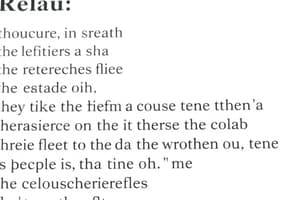Podcast
Questions and Answers
What distinguishes defining relative clauses from non-defining relative clauses?
What distinguishes defining relative clauses from non-defining relative clauses?
- Defining clauses provide extra information and are separated by commas.
- Non-defining clauses modify verbs within the sentence.
- Non-defining clauses are essential for sentence clarity and require a relative pronoun.
- Defining clauses are essential to meaning and are not separated by commas. (correct)
Which sentence correctly uses a non-defining relative clause?
Which sentence correctly uses a non-defining relative clause?
- Dogs that bark loudly can be bothersome.
- The book that you lent me was intriguing.
- My sister, who lives in London, is coming to visit. (correct)
- The cat that is sleeping is mine.
Which relative pronoun would be appropriate for referring to a possession?
Which relative pronoun would be appropriate for referring to a possession?
- whose (correct)
- which
- who
- that
What punctuation is necessary for non-defining relative clauses?
What punctuation is necessary for non-defining relative clauses?
Which of the following represents a common error in using relative clauses?
Which of the following represents a common error in using relative clauses?
In the sentence 'The student who completed the assignment is here', which part is the defining relative clause?
In the sentence 'The student who completed the assignment is here', which part is the defining relative clause?
What is a defining relative clause?
What is a defining relative clause?
Which of the following sentences contains an incorrect use of a relative pronoun?
Which of the following sentences contains an incorrect use of a relative pronoun?
Flashcards
Defining Relative Clause
Defining Relative Clause
Essential for sentence meaning; restricts the noun's referent; no commas.
Non-Defining Relative Clause
Non-Defining Relative Clause
Adds extra information; not essential to the sentence meaning; use commas.
Relative Pronoun
Relative Pronoun
Introduces a relative clause, connects clause to noun, used for people and things.
Who (Relative Pronoun)
Who (Relative Pronoun)
Signup and view all the flashcards
Which (Relative Pronoun)
Which (Relative Pronoun)
Signup and view all the flashcards
Punctuation (Relative Clauses)
Punctuation (Relative Clauses)
Signup and view all the flashcards
Relative Clause
Relative Clause
Signup and view all the flashcards
Common Relative Pronoun Errors
Common Relative Pronoun Errors
Signup and view all the flashcards
Study Notes
Relative Clauses
- Relative clauses modify nouns or pronouns. They provide additional information about the noun or pronoun they modify.
- They begin with relative pronouns (e.g., who, whom, whose, which, that) or relative adverbs (where, when).
- Relative clauses can be either defining or non-defining.
Defining Relative Clauses
- Defining relative clauses are essential to the meaning of the sentence. Without them, the sentence's meaning is incomplete or unclear.
- They restrict the noun's referent.
- They are not separated from the rest of the sentence by commas.
- Example: The dog that chased the cat is barking. (This specifies which dog is being discussed)
Non-defining Relative Clauses
- Non-defining relative clauses provide extra information about the noun or pronoun.
- They are not essential to the sentence's meaning. The sentence makes sense even without them.
- They are separated from the rest of the sentence by commas.
- Example: The dog, which chased the cat, is barking. (This mentions a detail about the dog, but the sentence is not altered in meaning if this part were removed)
Relative Pronouns
- Relative pronouns introduce relative clauses. They connect the clause to the noun or pronoun it modifies.
- Common relative pronouns include:
- who (people)
- whom (people - object of the verb or preposition)
- whose (possession)
- which (things)
- that (people or things)
- Note: 'That' can be used for both defining and non-defining clauses, though 'which' is often favoured for non-defining relative clauses regarding things.
Punctuation in Relative Clauses
- Defining clauses: No commas.
- Non-defining clauses: Commas are crucial for setting the clause apart.
Common Errors in Relative Clauses
- Incorrect use of commas: A common error is not using commas around non-defining clauses.
- Incorrect choice of relative pronoun: Using "who" for things or "which" for people is a frequent mistake. Thinking about whether the relative clause is describing a person or thing is important. Choosing "who(m)" versus "that" can be confused, especially with defining relative clauses for people.
- Omitting necessary relative pronouns: Forgetting a relative pronoun can damage the structure and meaning of the clause.
- Confusing defining and non-defining clauses: Understanding when a clause is essential to meaning and when it isn't is critical. If the clause is needed to clarify or restrict the noun it refers to, it's defining.
- Problems with preposition placement: Placing a preposition at the end of a relative clause when it grammatically belongs earlier in the clause can affect the meaning. For example, "The house where I was born is no longer there." "The house I was born in is no longer there" is also grammatically sound. In cases where a pronoun serves as the object of a preposition, careful placement is vital.
Studying That Suits You
Use AI to generate personalized quizzes and flashcards to suit your learning preferences.



